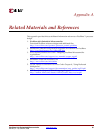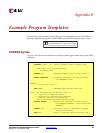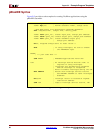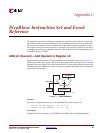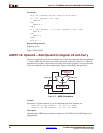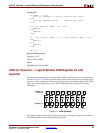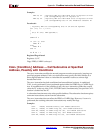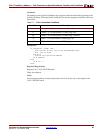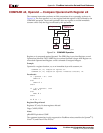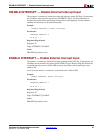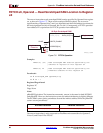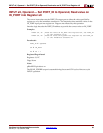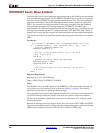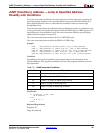
94 www.xilinx.com PicoBlaze 8-bit Embedded Microcontroller
UG129 (v1.1.2) June 24, 2008
Appendix : PicoBlaze Instruction Set and Event Reference
R
Examples
AND sX, sY ; Logically AND the individual bits of register sX with
; the corresponding bits in register sY
AND sX, kk ; Logically AND the individual bits of register sX with
; the corresponding bits in the immediate constant kk
Pseudocode
; logically AND the corresponding bits in sX and the Operand
for (i=0; i<= 7; i=i+1)
{
sX(i) Å sX(i) AND Operand(i)
}
CARRY Å 0
if (sX = 0) then
ZERO Å 1
else
ZERO Å 0
end if
PC Å PC + 1
Registers/Flags Altered
Registers: sX, PC
Flags: ZERO, CARRY is always 0
CALL [Condition,] Address — Call Subroutine at Specified
Address, Possibly with Conditions
The CALL instruction modifies the normal program execution sequence by jumping to a
specified program address. Each CALL instruction must specify the 10-bit address as a
three-digit hexadecimal value or a label that the assembler resolves to a three-digit
hexadecimal value.
The CALL instruction has both conditional and unconditional variants. A conditional
CALL is only performed if a test performed against either the ZERO flag or CARRY flag is
true. If unconditional or if the condition is true, the CALL instruction pushes the current
value the PC to the top of the CALL/RETURN stack. Simultaneously, the specified CALL
location is loaded into the PC.
A subroutine function must exist at the specified address. The subroutine function requires
a RETURN instruction to return from the subroutine.
The CALL instruction does not affect the ZERO or CARRY flags. However, if a CALL is
performed, the resulting subroutine instructions may modify the flags.
Examples
CALL MYSUB; Unconditionally call MYSUB subroutine
CALL C, MYSUB; If CARRY flag set, call MYSUB subroutine
CALL NC, MYSUB; If CARRY flag not set, call MYSUB subroutine
CALL Z, MYSUB; If ZERO flag set, call MYSUB subroutine
CALL NZ, MYSUB; If ZERO flag not set, call MYSUB subroutine




